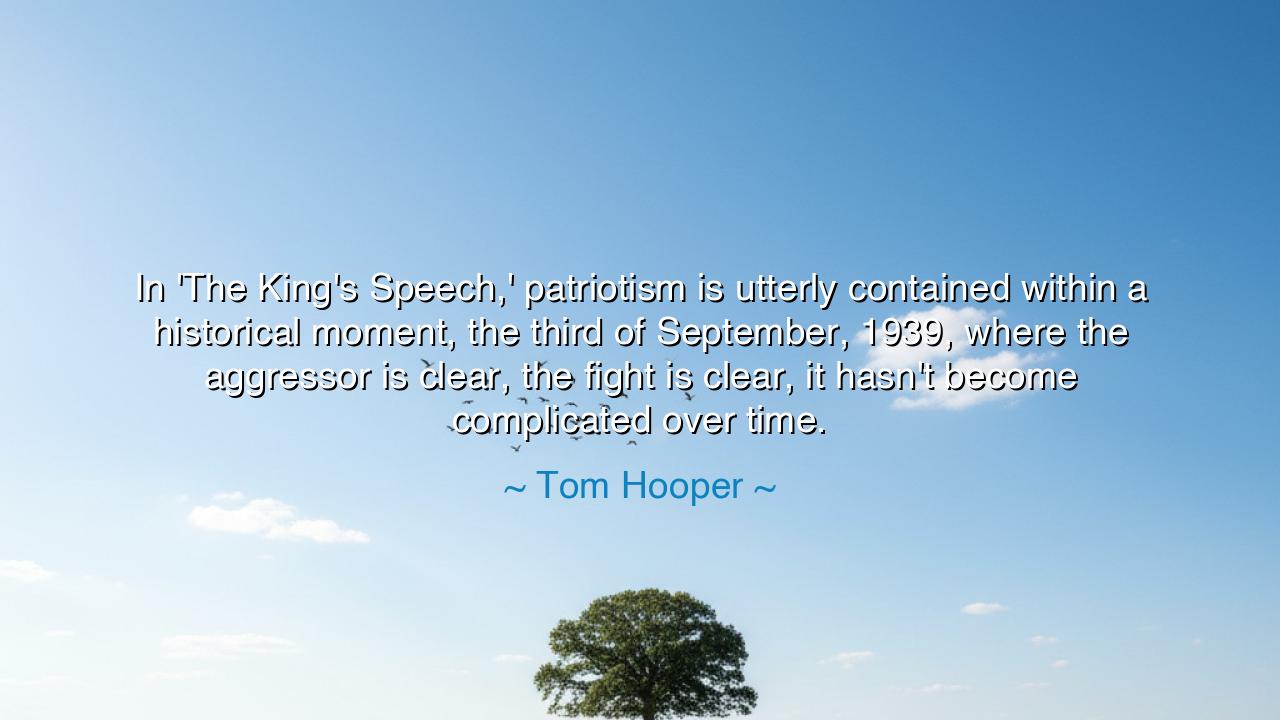
In 'The King's Speech,' patriotism is utterly contained within a
In 'The King's Speech,' patriotism is utterly contained within a historical moment, the third of September, 1939, where the aggressor is clear, the fight is clear, it hasn't become complicated over time.






The filmmaker Tom Hooper once reflected: “In 'The King's Speech,' patriotism is utterly contained within a historical moment, the third of September, 1939, where the aggressor is clear, the fight is clear, it hasn't become complicated over time.” In this observation lies a meditation on the clarity and immediacy of patriotism during a moment of existential crisis. Hooper highlights that patriotism, at its most vivid, emerges when moral and national duty aligns unequivocally with justice and action. The contours of loyalty, courage, and service are unmistakable when the threat is clear and the cause righteous.
In the wisdom of the ancients, the virtue of the citizen was most visible in times of decisive challenge. Aristotle and Cicero both praised courage and duty exercised under clear moral circumstances, when the good of the polis or republic was threatened. Hooper’s reflection echoes this understanding: patriotism reaches its purest expression when ambiguity is absent, when a people are united not by debate or convenience, but by shared recognition of right and wrong, friend and foe.
History provides such moments with resounding clarity. Consider the outbreak of World War II, the very moment Hooper references. On September 3, 1939, Britain declared war on Germany after the latter’s aggression against Poland. The lines were drawn: the aggressor was unmistakable, and the defense of liberty demanded courage, unity, and commitment. Citizens rallied, soldiers marched, and leaders spoke with resolve. In such moments, patriotism is not an abstract sentiment—it is an active, urgent, and collective engagement with the defense of nation and values.
Hooper’s observation also underscores the difference between immediate, unambiguous patriotism and the more complicated, nuanced expressions that arise in peacetime or in moral gray zones. Over time, questions of justice, policy, and interpretation can blur the clarity of allegiance. Yet in that historical moment captured in “The King’s Speech”, patriotism is distilled to its essence: courage in the face of aggression, steadfastness in duty, and a moral alignment between the nation and its defenders.
The meaning of this quote extends beyond the film and the historical moment. It is a reflection on human nature and the conditions under which the virtues of the citizen are most visible. Patriotism thrives when moral clarity coincides with national crisis, when the stakes are unmistakable and the obligations are urgent. It is a call to recognize the moral dimension of allegiance, and to act decisively when principles, values, and nationhood demand it.
Consider the story of Winston Churchill, who inspired Britain during those early days of World War II. Faced with the threat of Nazi invasion, he spoke boldly, mobilized resources, and appealed to the courage and unity of his people. His patriotism, like the moment Hooper describes, was unambiguous: the aggressor was clear, the fight was evident, and the nation’s moral and physical defense required unwavering resolve. This clarity allowed patriotism to flourish as both a personal and collective force.
The lesson for all generations is profound: patriotism is most potent when aligned with moral clarity and the defense of justice. In ambiguous circumstances, the virtue becomes more challenging to discern, yet the principle remains. Citizens must cultivate courage, awareness, and discernment to act rightly, even when threats are subtle or complex. The third of September, 1939, reminds us that duty and allegiance are clearest when moral and national purpose coincide.
Practically, this calls each individual to reflect upon moments of ethical and civic urgency. Recognize when your nation faces clear challenges to justice, liberty, or well-being. Stand with courage, speak with conviction, and act decisively in defense of the common good. In doing so, one embodies Hooper’s insight: true patriotism is distilled in moments of clarity, urgent, moral, and unmistakably aligned with the defense of what is right.






AAdministratorAdministrator
Welcome, honored guests. Please leave a comment, we will respond soon